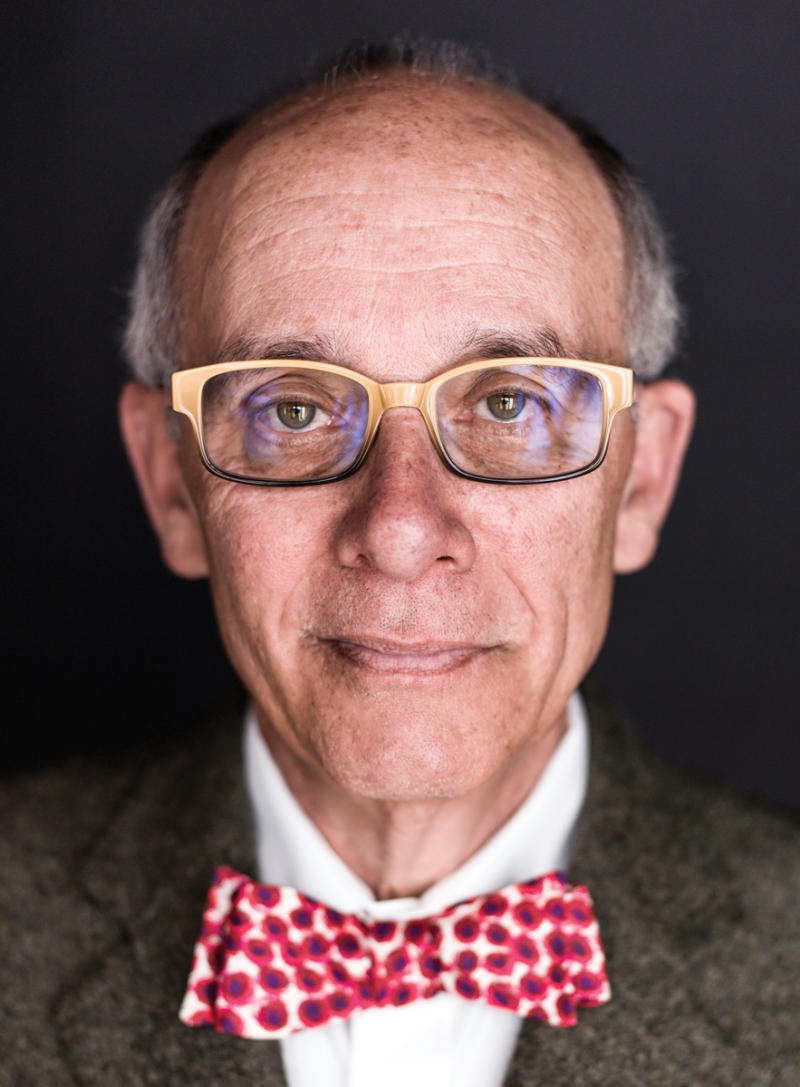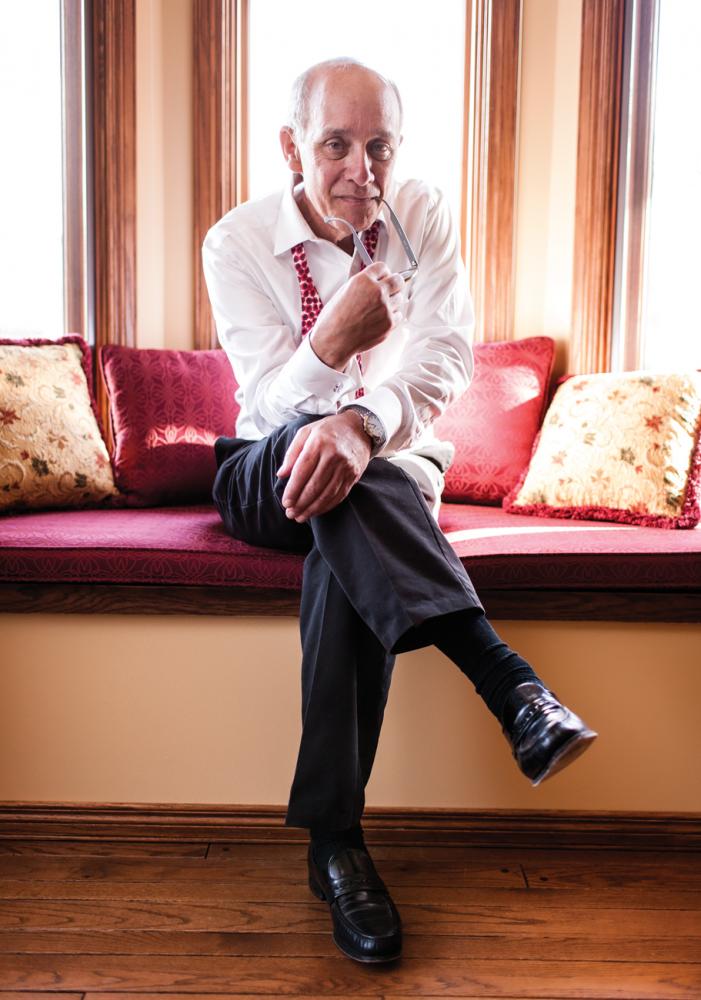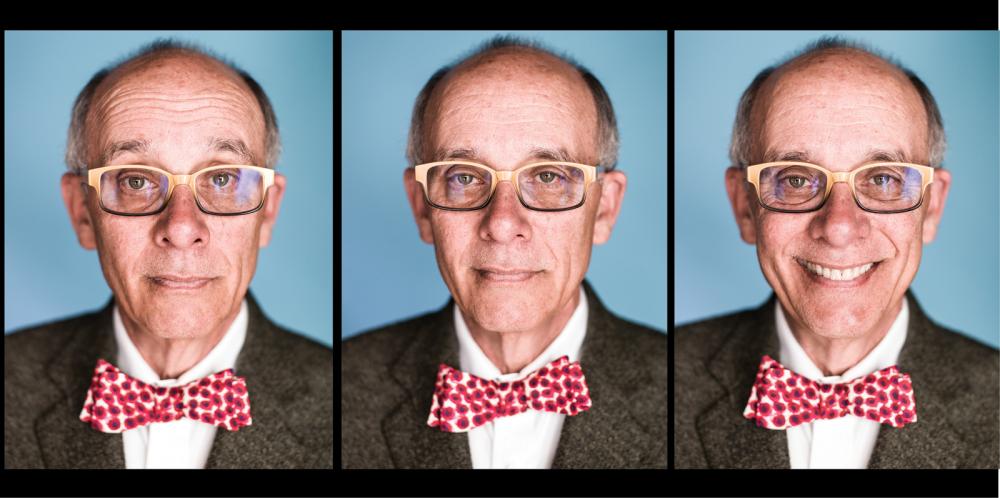
It’s October. Council is in recess, the 2013 election is two weeks away and, in a few days, Stephen Mandel will hand over the key fob to his spacious office overlooking Churchill Square. In the private washroom, he loops together a bow tie in preparation for his last proclamation as mayor. Over the last nine years, he’s proclaimed NextGen Month, Movember, Mark Messier Day, Barbara Poole Day, Right to Know Day – seemingly everything but International Talk Like a Pirate Day. And, now, Read-In Week for the umpteenth time.
He’s due at Concordia University College of Alberta in 25 minutes. “I’m going to miss the events, the people,” he says from behind the door. “Frankly, I’d love to run for four more years, but I don’t think it’s what’s best for the city. I don’t think I have enough fire in my belly to do it right.”
Once his bow tie is neatly in place and pinstriped jacket is squarely on his shoulders, Mandel grabs the keys to his Mercedes, steps over flattened boxes and is gone for a quick and easy speech. He politely sits through a multilingual song or two, and then he’s back in his blue S550 and off again for a Read-in at Anne Fitzgerald Elementary School. There, a specially appointed boy and girl escort him to a little sofa in a little library, where their classmates funnel in and gather around his feet.
In 12 years, these children will cast their first municipal votes and Mandel’s multibillion-dollar dream for a world-class city should be a generation old. By then, the arena, Quarters and Blatchford neighbourhoods will be more than cranes and dirt mountains; the LRT could be three times the size it was when they were born; a huge chunk of Leduc might be Edmonton and Edmonton will be a city of more than a million people. The third graders will likely hear his name again as they wade through the election noise they’re too young to understand today, but probably won’t remember him as the guy who read Mr. Peabody’s Apples to them.

What will they hear about him instead? What will they be told? Did Stephen Mandel make Edmonton their proud home or make it so expensive they want to move? For now, he’s just a man with a bow tie and storybook, and, for now, they just want a story.
Once upon a time – 1990, to be exact – Stephen Mandel heard about plans for Edmonton’s $49-million stone-and-glass City Hall and he was very mad. “We don’t need a new City Hall! How much are we spending on this?” he says petulantly, imitating his former self.
In hindsight, he says, “I was a typical small-business guy working 14 hours a day, seven days a week, and I didn’t get a chance to see the larger world and opportunity for this city.”
How does a man who used to kvetch about a pricy pyramid become one who tirelessly fights to build an arena at 10 times the price right next door? Even as a councillor, he would fight to stop property-tax increases but, years later, as mayor, help hike them 50 per cent over a decade to pay for his vision. That small-business man who once counted every dime became the biggest booster of new public infrastructure in recent memory. Why? In 1972, Mandel, then a 28-year-old from Windsor, Ont., moved to Edmonton. The son of David and Bessie Mandel, Jewish Canadians originally from Windsor, he came to help his dad sell RVs and learn what he could from the family business. Mandel was just about to marry Lynn Matheson, a dancer who’d performed on stage and screen, and was eager to begin his life after completing a BSc. in business administration and master’s in political science.
Lynn and Stephen arrived to an oil-boom city building subways, bridges and colleges, but a few years later the economy tanked and Mandel, now a father of two, didn’t know where his next dollar would come from. In 1982, his father died of colon cancer and Mandel was left alone to paddle through the uncertainty.
Though he named his development company Mandel Group in the early ’80s, it was really just one man with a lot of chutzpah. He invested in things both good and bad: A trailer park (good), a crushing park (bad), a shopping centre (good), an American minor-league hockey team (horrible, so horrible, in fact, that the Tucson Gila Monsters folded part way through their second season in the West Coast Hockey League).

“There were years where we made no money, just barely survived,” he recalls. “You take the good with the bad. I’d made a little more money than I lost, so it was time to quit.”
This risk-taking would later play out in high-cost city planning, but in 1999, the semi-retired 55-year-old was passing the time golfing. As he caught his breath, he looked at the city for what seemed like the first time since arriving. It was like nothing new had been built. Bupkes. To him, the 1980s recession didn’t just erode the economy, but civic pride. “As a small business person, you go about your life and don’t have time to look out on the world. Now I had more freedom and money, and I started to get active in organizations and see that, as a city, we weren’t being successful. People were lulled into a sense of – worse than complacency – it was defeatism.”
His children and his friends’ children were moving away. While Calgary had this “electricity” to it, Edmonton, he says, was falling behind. “Lynn opened my eyes to the fact that we, as a city, had to be more aggressive, proactive, and not be afraid of some of the consequences,” he says about his wife. Would Edmonton have had a different mayor if it weren’t for her? “Oh, God yes.”
More than anything though, he was just bored, especially of golfing. A place in council chambers, he says, would give him “something to do.” It seems highly unbelievable that a four-term politician would have been inspired by idleness, but, when asked again and again, Mandel maintains that it was boredom that led him there.
But Mandel had made a run for public office before. In 1998, he campaigned for school trustee and the incumbent Jean Woodrow pummeled him at the polls. Now, three years later, he would vie for an open seat in City Hall, the stone and glass pyramid that he’d once condemned as a waste of public dollars – a “palace” that council had built for itself on the backs of the hard-working people. Now he was part of council, a spot he earned by fewer voters than could fill a diner.
Mandel had little vision. He thought the most pressing issue was an overpass on the Yellowhead that wasn’t being built fast enough. But people liked his candor. “With Stephen, what you see is what you get,” says longtime friend Irv Kipnes. “He’s very straightforward, unpretentious. Very object-oriented. In his mind, getting the thing done is what’s important.”
But when Mandel arrived at City Hall, he realized there were no things to get done. The whole purpose of council, to him, seemed to be doing (and therefore spending) as little as possible. Sure, inaction kept taxes low, but artificially low, he says. And it was at the expense of crumbling streets and dank libraries, basic infrastructure that any self-respecting city would properly maintain. He only had people like himself to blame.
“I was a ‘good-enough’ person. When I went to the city, I had no passion whatsoever,” he admits. “And then I got there and I got to see the bigger picture. I saw what was happening – nothing was happening. We were stagnant because we didn’t want to make people angry. And when you don’t do anything, nobody is really mad atcha. It’s easy. It’s safe. Everyone else is booming from this tremendous growth and we’re stagnant. We have to be a city with dreams.”
Mandel was elected to be the “fiscal hawk” on council. When he arrived in October 2001, former Edmonton Journal columnist and now newly minted councillor Scott McKeen dubbed him an “all-star right-wing.” McKeen, who reported on most of Mandel’s 13-year tenure in council chambers – watching him warm up to pricy projects, beginning with Churchill Square’s $12 million reno – now realizes his first analysis wasn’t entirely accurate. “He’s a fine example of how in municipal politics you can be all over the map.”
Mandel’s politics evolved to be even more complicated after he ran against Bill Smith for mayor in 2004 and won despite all the polls and pundits (McKeen included) saying he wouldn’t. As Edmonton’s 34th mayor, he would fight to turn the municipal airport into a dense, net-zero neighbourhood, while letting urban sprawl run wild; champion quality architecture, while supporting a downtown strip mall; boast about Edmonton’s progressive green policies, while voting to make Horse Hills farmland into an industrial park; promote a cohesive plan with neighbouring municipalities, then surprise them with annexation plans. At times it seemed like there were two mayors, progressive Mandel and conservative Mandel, take-no-prisoners Mandel and take-what-we-can-get Mandel.
“We did things because we thought they were right,” says Mandel. “We were able to work with our council colleagues because we believed they were right, that they were what’s best for the city.” Indeed, even on the most contentious issue, the arena, there were just three nays. But while it would be easy to say that Mandel played only a small part in the future of the city – he’s just one vote, after all – his dominant voice set a tone that most council members and staff eagerly accepted, even as this tone drove the debt up 700 per cent to nearly $3 billion.
Patricia Misutka, Mandel’s former chief of staff, now completing her doctorate, says she believes the former mayor handled the city’s finances well. “Stephen understood whatsmart debt was about,” she says. “He’s always been a fiscal hawk. I don’t think anyone will go through the budget the same way again, getting the waste out.” Edmonton-Gold Bar MLA David Dorward would disagree. When Dorward ran against the mayor in 2010 – and came closer than any previous opponent to unseating him – it was because Mandel’s administration repeatedly let staff get away with cost overruns, he says. Dorward needs no prompting to praise Mandel’s leadership and vision, but on financial matters he digs in his heels. “Budgeting should never be decisions between overpriced alternatives.”
And while, in time, people might pick the airport lands or arena – or their high costs – as his legacy,it’s easy to forget that Mandel also pushed major social policies.For instance, the plan to end homelessness that he dreamed up with then-premier Ed Stelmach in 2009 has since reduced the homeless population by a third. “He did manage to balance two different policy streams that a lot of politicians can’t,” says political scientist Judy Gerber of the University of Alberta. “He managed to work on both the splashy developments – the art gallery, provincial museum, arena, the Quarters – but he managed to also be an activist on homeless issues.”
This socially conscious side, Mandel says, comes from his late mother Bessie, whom he adored. She was a do-gooder for equal rights and other social causes. Mandel inherited his desire to help others from her. When he talks about his late mother, a gentle smile creeps over his natural pout, his sunken eyes shut and he nods off.
Yes, he can be schmaltzy, but he can also be a bully. Public servants still regale each other with stories about witnessing Mandel’s outbursts, which weren’t always so private, and he sometimes berated city staff until they walked away ghost-pale. Perhaps McKeen puts the mayor’s contradictions in context best: “We’re all complex, but I think he was openly complex. Stephen Mandel was Edmonton’s first openly complex mayor.”
Mandel maintains that he tried to build a city for his children’s generation, to keep them from leaving like so many had. For the most part, he did build that city, evident not just in the three campaigns he won handily, but the overwhelming support for Mayor Don Iveson to continue his vision. What the next generation’s children will make of him though is a big unknown.
“Some people have been very kind, and some think I’m an asshole. That will be something for them to decide,” says Mandel, who’s cozily dressed in a sweater over a collared shirt.
It’s December now. The floor of his Gariepy home is strewn with plastic toys, a humongous teddy bear and a tiny basketball net. There’s only one kid in the room now, his year-old grandson Chase, who gets into everything no matter how out of reach it seems. Mandel is loving it. Babysitting Chase is what he’s anticipated most post-politics. Raising his own kids, Rachel and Adam, is a total blackout. “I don’t remember a thing about my kids. I had to make a living,” he says with his feet on a coffee table.
He’s more relaxed now and more nostalgic, willing to at least entertain the idea of a legacy, so long as it’s in the context of what Chase will inherit as he grows up. “I hope Edmonton will feel like the progressive, dynamic, innovative city that has great respect for itself,” he says. “When I talked about Edmonton being a ‘Capital City’ again, it was a euphemism for having some pride. And I think we did that; I think there’s a different attitude about who we are. I’m very proud of that.”
Since that interview, there have been rumours swirling around business and political circles that he’ll make a run for MLA next provincial election. The gossip seems to have grown from his attendance as a PC delegate at the Premier’s leadership review. Surprisingly, he’s not outright denying the plausibility. “My future plans are in the future,” is all he’ll say.
It seems unlikely that he’ll pursue the position, though, as he turns 69 this year. But, then again, he’s already bored. And we all remember what happened the last time Stephen Mandel was bored.










